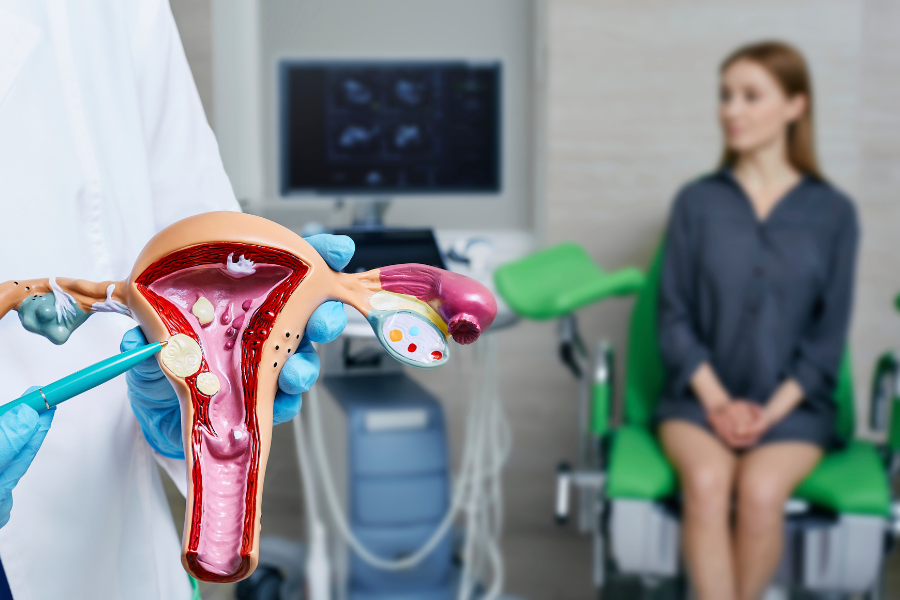
Fibroids, also known as myomas or fibromyomas, are a relatively common issue affecting an estimated 70 percent of women. Most women have anywhere from six to eight fibroids in their uterus, and they usually have less than a one percent chance of being malignant. While these growth are prevalent in the general female population, that doesn’t mean they don’t require attention and treatment.
Fibroids are non-cancerous tumors that develop from the muscular walls of the uterus, growing over time thanks to a steady supply of blood flow and hormones. The severity of fibroid issues can vary from woman to woman. A big factor that affects whether fibroids cause symptoms is their size. These growths can balloon to eight inches in diameter or more, typically growing over several years after starting their life on a microscopic scale.
Larger fibroids almost always cause trouble. But what about the smaller ones? Do you need surgery for small fibroids?
Do Small Fibroids Cause Pain and Other Problems?
Contrary to popular belief, fibroids don’t have to be massive to cause discomfort and affect your quality of life. There is no such thing as a size threshold that dictates when women should get small fibroids treatment. Whether or not you should seek treatment depends entirely on the symptoms they create.
Fibroids of any size can cause pain and numerous health problems. When these tumors develop inside the uterus, they create unnecessary pressure on the uterine wall. One type of fibroid, submucosal fibroids, alters the uterine lining, resulting in an increased risk for reproductive issues in the future. Fibroids that grow outside the uterus might press onto the spinal nerves, bladder, and rectum. Either way, the result is intense abdominal and pelvic pain that worsens the bigger the tumors get. But that’s not all.
Fibroids, big and small, can also interfere with your health and sexual activity. Common symptoms that arise due to fibroids include:
- Pain during intercourse
- Abdominal distension
- Urination difficulties
- Heavy menstruation bleeding
- Irregular periods
- Constipation
In some cases, fibroids can also impact fertility. The tumors can cause problems for pregnant women by compromising fetal growth and increasing the odds of miscarriage and preterm labor.
Ultimately, it doesn’t matter how big fibroids get. If they’re causing pain or other symptoms, it’s important to seek treatment even if they are small fibroids.
RELATED: Do Fibroids Affect Pregnancy?
Treatment and Surgery for Small Fibroids
There are many ways to approach small fibroids treatment. Before you discuss those options with your healthcare provider, you must get a diagnosis. Common diagnostic procedures involve non-invasive and minimally invasive techniques. That might include ultrasonography, hysteroscopy, or hysterosonography. Modern 3D and 4D imaging makes it easier for providers to visualize, diagnose, and monitor fibroids.
From there, you can work with your doctor to develop a treatment plan for your unique case. Because fibroids can vary in size and location, recommended treatments depend on your situation.
Women experiencing heavy bleeding can often rely on medications. Contraceptive pills, progestational agents, and Gonadotropin-releasing hormone (GnRH) agonists can address menstruation changes and temporarily shrink fibroids. They prevent the tumors from getting bigger while you continue taking the medication. The same goes for hormone-releasing intrauterine devices.
If the tumors are causing pain, pressure, or fertility problems, surgery for small fibroids may be your best option. In the past, hysterectomies were the go-to solution. However, there are many other surgical procedures available.
Your doctor may recommend uterine artery embolization (UAE). It’s a minimally invasive procedure that involves cutting the blood supply to fibroids through a needle incision in the groin.
Other procedures include myomectomy via laparoscopy or hysteroscopy. The former requires surgeons to cut and remove fibroids through a small incision near the public line. Meanwhile, the latter involves inserting a telescopic instrument through the cervix. The right technique for your case will depend on the size and location of the fibroids.
It doesn’t matter what size your fibroids are. If they’re causing noticeable symptoms and pain that affects your quality of life, you can seek small fibroids treatment with Dr. Michael Tahery. As an experienced urogynecologist and fibroid specialist, Dr. Michael Tahery has the skills and experience to find the right treatment for you. Dr. Tahery has performed over a thousand minimally invasive operations, helping women throughout Los Angeles and the surrounding areas. Contact our office today to schedule a consultation and learn more about your options for small fibroids treatment.